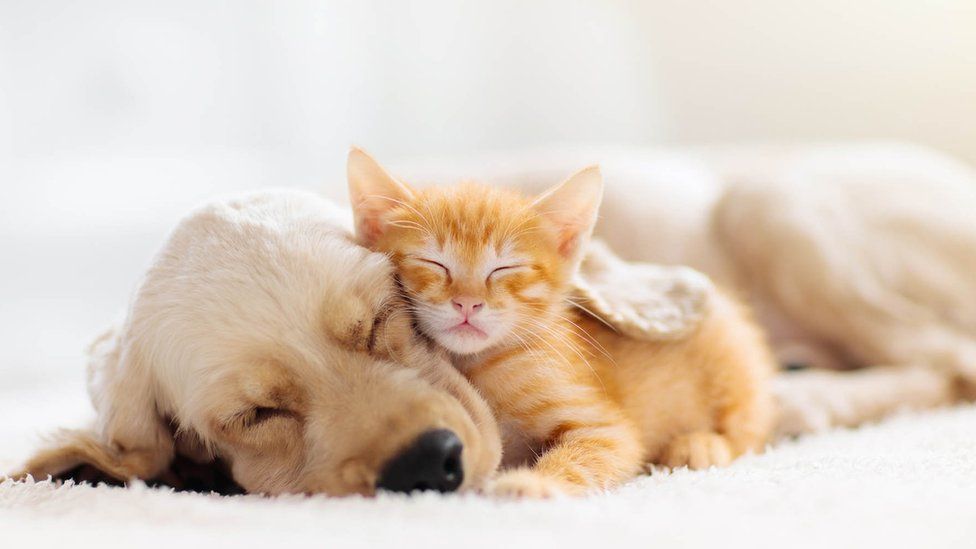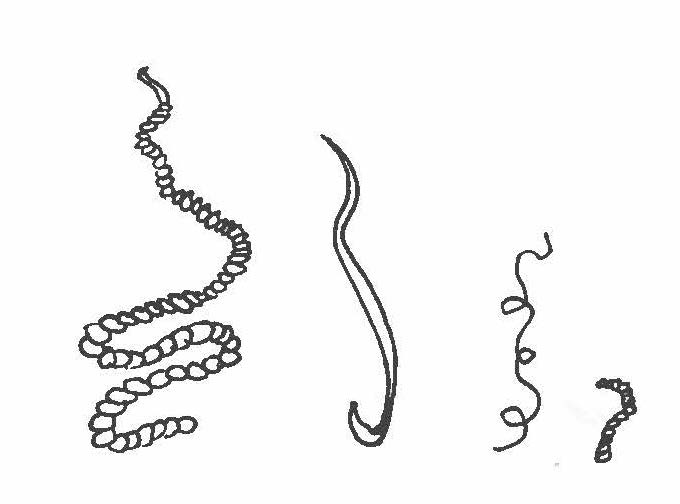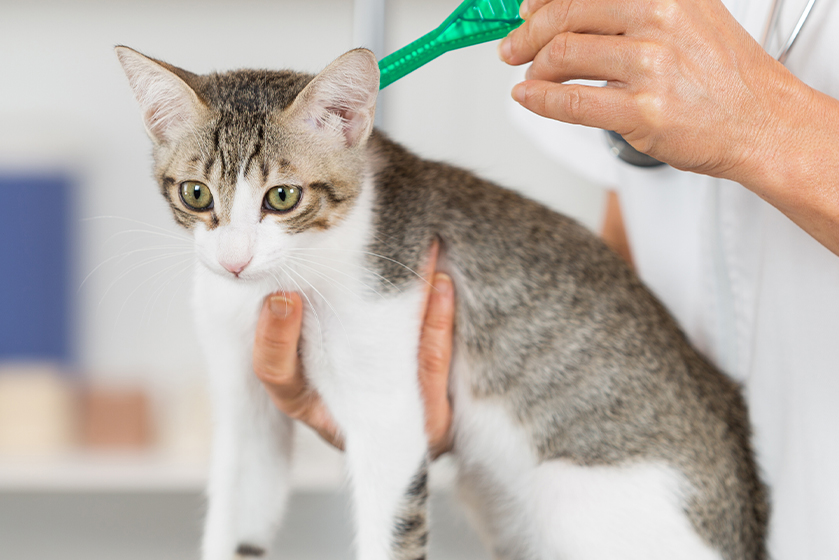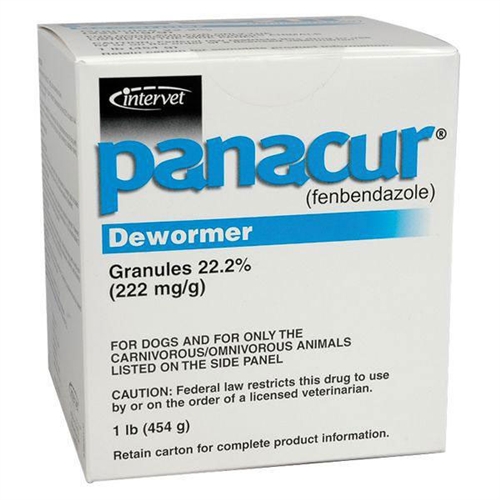Worms are parasites that can infect both cats and dogs.
While there are many different types of worms, the most common type of worm found in both cats and dogs in the United States is the roundworm.
But other worms like tapeworms and hookworms are also probable.
Roundworms are typically acquired through contact with contaminated soil or feces.
Infected animals can pass larvae in their stool, which can then contaminate the environment.
Worms have serious health effects on both cats and dogs, and can even be fatal if left untreated.
This is why it’s good to figure out how cats get worms. This way, you can take the necessary preventive measures.
Can Cats Get Worms From Dogs?

If you have both cats and dogs, then there is a chance that your cats can pick up worms from your Dogs.
See, dogs are definitive hosts for most parasitic worms, and according to PetMD, your cat can easily get these worms from dogs.
This is because some of the roundworms and tapeworms that infect dogs are not species-specific. They can use a dog as an intermediate host and then move to the cat as their new host if they get a chance.
All it takes is for an infected dog to pass larvae in its stool, thereby contaminating the environment.
Cats will then easily get infected once they come into contact with the larvae.
Apart from the larvae, worms can also be transferred from the dog to the cat through eggs.
These parasite eggs are typically passed in the stool of an infected dog and they can survive in the environment for a very long time.
Your cat can then get infected by ingesting the eggs when they come into contact with contaminated soil or feces.
Once ingested, the worm will grow inside the cat into adult worms and then continue reproducing.
In addition to eggs and larvae, cats can also get worms from the dog’s fleas. This is because some fleas are carriers of the tapeworm larvae.
If a cat lives in the same house as a dog that has fleas, the fleas can easily migrate from the dog to the cat.
When the flea bites the cat, it will then pass the larvae to the cat, causing them to become infected.
The CDC warns pet parents to be vigilant when taking care of kittens because they are more vulnerable than adult cats.
This is because their immune system is not yet fully developed and they are more likely to contract parasites.
Additionally, kittens are very playful and adventurous and are more likely to eat dirt than older cats.
They can therefore get easily infected by worms just by eating dirt that has the eggs of worms.
But adult cats are still susceptible to worms as long as the environment is contaminated.
See, cats are relentless self-groomers and after they walk through a contaminated area, they will likely ingest the eggs or larvae as they groom.
So, the only way to ensure your feline friend is safe from these parasites is to make sure your environment is not contaminated with these pesky creatures.
Types of Worms Cats Can Get From Dogs

A. Roundworms
The most common type of worm that cats can get from dogs is the roundworm.
Roundworms resemble spaghetti and can grow up to seven inches long. They are typically white or light-colored
Roundworm eggs are as small as grains of rice, which means they are visible to the naked eye.
These worms live in the intestines of their host, and their eggs are passed in the stool.
This means that roundworm infections from dogs to cats typically happen through the stool of an infected dog.
B. Hookworms
Cats can also get hookworms from dogs, although this is less common.
Hookworms are small, dark-colored worms that attach themselves to the lining of the intestines of their host.
They feed on blood, and their eggs are too small to be seen without a microscope.
Just like is the case with roundworms, the Hookworm’s main mode of transmission is through contact with contaminated soil, which is typically contaminated by the stool of an infected dog.
A cat can also get hookworm infection from eating an infected animal, such as a mouse or bird.
C. Tapeworms
Finally, cats can also get tapeworms from dogs.
Tapeworms are long, flat worms that live on the intestinal wall of their host.
Their eggs are often visible as small, white segments in a cat’s stool.
Tapeworms are notorious for being difficult to get rid of, and they can cause serious zoonotic diseases in cats if left untreated.
The most common way for a cat to get tapeworms is by eating an infected flea.
However, they can also be transmitted through tapeworm eggs that are found in contaminated soil or stool, or by eating an infected animal.
Other Most Common worms in Felines
Here are other worms that may not necessarily be passed from dogs to cats but are common among felines:
- Heartworm
- Lungworm
- Whipworms
- Stomach worms
- Bladder worms
- Liver flukes
Can Indoor Cats Get Worms From Dogs?

Cats and dogs are both susceptible to various types of worms, but it is very unlikely for indoor cats to get worms from dogs.
Most of the worms that are passed from dogs to cats are passed through their feces.
This means that indoor cats are less likely to get infected with these pesky creatures (from dogs) because they would have to come into contact with the dog’s stool for that to happen.
Indoor cats can still get worms, but it is more likely that they will contract them from another cat or from eating infected prey.
That said, it is still possible, even though very unlikely, for your indoor cat to get worms from dogs.
While your cat may not leave the house, young children, pets, and other members of the family do and they could bring back the pests to the house.
Additionally, some worms are spread through dog fleas. This would mean that if a dog has fleas and lives in the same house as an indoor cat, the dog could potentially transmit worms to the cat through fleas.
As a rule of thumb, every pet parent should practice hygiene as a preventative measure.
As a bare minimum, you should regularly wash your pet’s bedding and toys in addition to keeping the house spick and span.
Hygiene can help reduce the risk of your pet contracting worms as well as other diseases.
Can Cats Get Worms From Other Animals?

Yes, cats can get worms from other animals.
Unlike Toxocara Cati and other similar pests that only target certain species, there are lots of worms that are not species-specific and can move from one pet to another.
For instance, if your pets eat from the same bowl, or if your cat finds a piece of food on the ground that another animal has been eating, then they might just be exposed to worms.
As we have seen, contaminated stool is the main way worms are transmitted and so any animal that is infected could potentially pass the parasitic infection this way.
If an animal with worms defecates in your garden and your cat then walks through the feces, they could end up getting infected.
Cats can also get worms from the prey they hunt and eat.
For instance, a mouse or a rat that has worms could easily pass it over to a cat that hunts them. This is one of the reasons why pet parents should train their cats to only eat cat food served in their feeding bowls.
If your cat lies down on a contaminated surface, she could easily get infected with some worms.
For instance, tapeworms can easily burrow through the skin like other external parasites and get into the bloodstream of your feline friend.
This means that any animal could potentially contaminate the ground and then your cat could easily pick up the parasites just by coming into contact with the environment.
How to Tell If Your Kitty Has Contracted Worms

How do you know that your kitty has intestinal worms? Well, the following symptoms are signs that your feline friend may be infested:
- Visible worms in your kitty’s stool or vomit
- Weight loss
- Increased appetite
- Clumped, rumpled, or dull coat
- Pale or white gums
- Frequent or abnormal vomiting
- Dark, tarry stool
- Diarrhea
- Distended abdomen
- Coughing
- Abnormal breathing
- Lethargy
- Stomach pain
- Anemia
- Skin lesions
- Poor/unhealthy body appearance
The moment you notice any of these symptoms, contact your vet so that he/she can examine your kitty immediately.
Your vet will do a few tests (such as direct smear, Baermann, fecal float, and fecal culture) to accurately diagnose worms that have infested your kitty.
How to Prevent Transmission (Or Re-Infestation) Of Worms from Dogs to Cats

Worms are undesirable because they can result in serious health complications.
If left unchecked, their infestation could prove fatal. For this reason, it is important to do whatever it takes to prevent their transmission or re-infestation.
Here are a couple of tips to help you stop the transmission of worms from dogs to cats.
I. Keep them separate
Since it is relatively easy for worms to pass from dogs to cats, keeping your cat away from dogs is a sure way of keeping them safe from the worms.
This is a good tip for pet parents who only own cats and don’t own dogs.
You can avoid taking your cat to places that have dogs such as parks.
However, this may not be practical for pet parents that own both dogs and cats.
But you can still minimize their exposure to other dogs that are not part of your family and that will help greatly.
II. Worm Your Dog and Cat Regularly
If you own a dog, it is recommended that you worm them regularly to eliminate any worms from their system and thereby reduce the chances of transmission to your cat or other members of the family.
As a rule of thumb, vets recommend that you worm your puppies every fortnight until they are 12 weeks old. After this, you can continue worming them monthly.
The monthly worming exercise should continue until your puppies turn six months after which you can start worming them every three months.
In addition, it is also recommended that your worm your cat just as regularly.
Kittens should be treated for worms every two weeks until they turn eight weeks old.
After this, the cats should be wormed after every 1-3 months for the rest of their life.
III. Practice Good Hygiene
It is vital to maintain good hygiene in your home because worms are mostly spread through contaminated surfaces.
If your dog passes stool in or around the house, make sure you clean it up immediately and dispose of it properly.
Thoroughly wash your hands with soap and water after cleaning up the stool to avoid infecting yourself or your cat.
It is also important to regularly clean your cat’s litter box because this could be another source of contamination.
Scoop out the waste daily and dispose of it properly.
Wash the litter box with soapy water at least once a week to get rid of any parasites that might be lurking there.
If One Pet (Dog Or Cat) Has Worms, Do I Have To Treat Them All?

If your pet has worms, it’s important to get them all treated.
Since your pets share the same space and often play together, it is very likely that one infected pet can easily transmit the worms to the rest.
This is not only true for the same but also for different species because these pests can move across the species.
In fact, it is best to do regular worming of all your pets just to be cautious.
Otherwise, your pets and your family are at risk of becoming infected by these parasites.
Also, if you think your pet may have worms, it’s important to take them to the vet as soon as possible.
The vet will take a stool sample and some blood tests for examination after which they’ll prescribe the appropriate treatment for your pet, and they can also give you advice on how to prevent your family from becoming infected.
Can I Use The Same Products To Control Worms In My Dogs And Cats?

While there are several products on the market that claim to control worms, it is important to understand that not all of these products are safe for both dogs and cats.
In general, products that contain pyrantel pamoate or fenbendazole are safe for use in both dogs and cats.
However, products that contain ivermectin should only be used in dogs, as it can be toxic to cats.
Therefore, when choosing a worming product, it is important to read the label carefully to ensure that it is safe for your pet.
Better still, consult with a certified vet to know the best products to use for your pets.
Summary
In conclusion, cats can get worms from dogs. This is because some worms that infect dogs are also known to infect cats.
For this reason, it is important to practice good hygiene in your home and to regularly worm your pets to prevent the spread of these parasites.
Also, if you have reason to believe that your pet may have worms, it is best to take them to the vet as soon as possible so that they can be properly diagnosed and treated.

Hi! I am Eleanor Price. I started this website after my cat, Louie, almost died from a case of botulism (a type of food poisoning often caused by bacteria that grow on food items). Turned out that my cat’s diet was the problem. I have made it my duty to provide the best information and recommendations about everything cat lovers need to know about their felines’ health and wellbeing. My goal is to find the most informative content on anything feline-related and share it with fellow hardworking kitty lovers.

